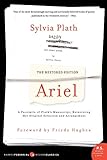The poem is Sylvia Plath’s patricidal “Daddy” and the voice her own, recorded for the BBC in October 1962, less than five months before her death at age 30. That day, she read aloud more than a dozen of the poems that would help make up Ariel, the posthumous collection that would make her name, as she herself foretold.
 Writing about these same recordings in the New York Review of Books in 1971, Elizabeth Hardwick
describes how “taken aback” she was by them. “Clearly, perfectly,
staring you down,” she writes, describing Plath’s delivery. “She seemed
to be standing at a banquet like Timon, crying, ‘Uncover, dogs, and
lap!’”
Writing about these same recordings in the New York Review of Books in 1971, Elizabeth Hardwick
describes how “taken aback” she was by them. “Clearly, perfectly,
staring you down,” she writes, describing Plath’s delivery. “She seemed
to be standing at a banquet like Timon, crying, ‘Uncover, dogs, and
lap!’”I still remember my surprise at hearing these recordings on my tinny cassette recorder in my freshman dorm room more than 25 years ago. I suppose I expected something more ethereal, a doomy Ophelia floating down the river. There was, instead, something ferocious about them. First, it unsettled me; then it excited me.
 Like
many women, I saw myself in Plath: a diligent, high-achieving young
woman, a striver privately bristling against social conventions and
punishing gender roles. (“A living doll, everywhere you look,” she
writes in “The Applicant.” “It can sew, it can cook…will you marry it,
marry it, marry it?”) But Plath more than bristled; she burned. In so many of her poems and in her mordant, acid-tongued novel The Bell Jar, you can feel the rage rippling off the pages.
Like
many women, I saw myself in Plath: a diligent, high-achieving young
woman, a striver privately bristling against social conventions and
punishing gender roles. (“A living doll, everywhere you look,” she
writes in “The Applicant.” “It can sew, it can cook…will you marry it,
marry it, marry it?”) But Plath more than bristled; she burned. In so many of her poems and in her mordant, acid-tongued novel The Bell Jar, you can feel the rage rippling off the pages.Growing up in the Midwest in the 1980s, I was a hard worker, a straight-A student, a people-pleaser, disciplined and dutiful. A Tracy Flick without the swagger. But when I first read “Daddy,” its incantational rhythm, its audacious analogies (the speaker likens herself to a concentration camp victim, her father to a Nazi, her husband to a vampire), it unleashed something inside me. I wanted to write like that. Bold, risk-taking, confrontational. “The work of a mad woman on fire”: That’s how my creative writing professor charitably classified the deeply derivative poems I wrote under Plath’s spell. But it didn’t matter that they were derivative. What mattered was that I—this well-behaved, compliant young woman—was writing from deeper, darker places, reservoirs of anger and frustration I’d always denied were there.
Even back then, it felt to me like Plath was writing from this secret, shared subterranean place—a place where girls and women let loose all their “unacceptable” feelings: bald ambition, aggression, frustration, resentment, rage. But now, in 2018, that place no longer feels so subterranean. “The anger window is open,” Rebecca Traister wrote last November. “For decades, centuries, it was closed: Something bad happened to you, you shoved it down, you maybe told someone but probably didn’t get much satisfaction—emotional or practical—from the confession.” In the aftermath of the 2016 campaign, the inauguration, the Harvey Weinstein scandal and everything that’s followed, it’s impossible to shake the feeling that the lid’s been torn off. The subterranean is no longer subterranean. Instead, it’s terra not-so-firma. Everything’s different now. ... [mehr] https://themillions.com/2018/07/a-mad-woman-on-fire-on-sylvia-plath-and-female-rage.html
Keine Kommentare:
Kommentar veröffentlichen